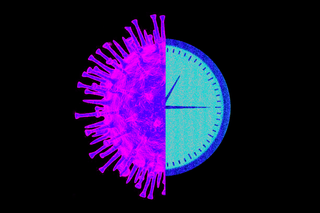
Women, Younger People Are at Greater Risk of Developing Long Covid: Study
A large-scale study has documented 62 symptoms of long Covid — validating the experiences of millions struggling with it.

Partial or complete loss of the senses of taste and smell, persistent fatigue, breathlessness, joint pain, and brain fog are a few symptoms of Long Covid or post-Covid syndrome we may have heard of. Turns out, these comprise less than 1/12th of the vast spectrum of symptoms people worldwide have been experiencing after recovering from Covid19, showed a new study.
A large-scale study published in Nature Medicine documented 62 symptoms of long Covid. Only 20 of the 60+ symptoms identified by the researchers are part of WHO’s clinical case definition for long Covid. Hair loss, reduced libido, erectile dysfunction, and bowel incontinence were some of the less-discussed symptoms that the research highlighted. Chest pain, swelling of limbs, and hoarseness in voices were some of the other symptoms documented by the researchers.
The findings validate the experiences of millions of people, who are struggling with post-Covid health woes. “It also reinforces that their symptoms cannot simply be attributed to other factors such as existing health conditions, or the effects of stresses related to living through the pandemic,” co-authors Anuradhaa Subramanian and Shamil Haroon, both from the Institute of Applied Health Research at the University of Birmingham, wrote in The Conversation.
The study chose to focus on Covid19 survivors who weren’t hospitalized due to having a milder infection — a demographic that has been relatively underexplored. The researchers assessed the health data of 4,86,149 adults in the U.K. who were diagnosed with Covid19 between January 31, 2020, and April 15, 2021. Then, they compared the information with that collected from 19,44,580 individuals, who have never been diagnosed with the novel coronavirus, and were, therefore, part of the study’s control group. The control group members were chosen out of a pool of more than 8,000,000 individuals. They were picked based on their sociodemographic similarities with the patients — in terms of smoking habits, body mass index (BMI), and comorbidities.
Related on The Swaddle:
‘Long Covid’ Patients In India Are Struggling, But Their Plight Remains Unseen
“[The] differences in symptoms reported between the infected and uninfected groups remained even after we accounted for age, sex, ethnic group, socioeconomic status, body mass index, smoking status, the presence of more than 80 health conditions, and past reporting of the same symptom,” Subramanian and Haroon wrote.
Based on clusters of symptoms reported, the researchers were actually able to categorize the people experiencing Long Covid into three distinct groups. First, the smallest group, including just about 5% of patients, were mostly experiencing respiratory symptoms like coughing and breathlessness. Second, the group with just about 15% of the patients, largely struggled with cognitive and mental health-related symptoms like depression, brain fog, and insomnia. And, third, the largest group of patients — at 80% — were dealing with the broadest spectrum of symptoms, including everything from fatigue, to rashes, to joint and muscle pains.
The researchers also discovered that 18 to 30-year-olds were more likely to develop Long Covid than individuals aged between 30 and 39 (by 6%) and those over 70 (by 25%). Similarly, women, too, were more vulnerable. “[Y]ounger age, female sex, belonging to certain ethnic minority groups, lower socioeconomic status, smoking, obesity, and a wide range of health conditions were all associated with a higher risk of reporting persistent symptoms more than 12 weeks after Covid19 infection,” noted Subramanian and Haroon.
It is pertinent to note, however, that the breadth of post-Covid symptoms experienced by survivors of Covid19 may — or may not — have been captured exhaustively by the present study. In the words of Subramanian and Haroon, “[N]ot everyone will report symptoms to a doctor, so our study was restricted… It’s also possible some patients in the [control] group had Covid, but either didn’t get tested or didn’t notify their [general practitioner].”
Related on The Swaddle:
For Long Covid Patients, Support Groups Address the Limitations of Medicine
That doesn’t diminish the value of the present study, though. Medical practitioners being more aware of the prevalence of specific symptoms like reduced sex drive or disruptions in bowel movements can, perhaps, help them design follow-ups for Covid19 patients in recovery. Not only that, but awareness of vulnerabilities in the population might also help researchers formulate targeted interventions.
The study also kindles hope that women — a group that has a history of being medically gaslighted — will finally be able to access the help they need, without being told “It’s all in your head.”
The importance of this research is also tied the vast swathe of people who can benefit from it. The number of Long Covid patients across the globe is literally estimated to run into millions — 100 million, to be precise, according to a study from 2021, which concluded that 40% of Covid19-survivors experienced post-Covid symptoms. Small-scale Indian studies, too, suggest several patients here are dealing with long Covid.
“The burden of poor health in Covid19 survivors is overwhelming,” Paddy Ssentongo, an assistant professor at the Penn State Center for Neural Engineering, who wasn’t involved in the present study, had said last year. “Pne’s battle with Covid doesn’t end with recovery from the acute infection.” That’s the “battle” studies like this are helping healthcare systems buckle up for.
Devrupa Rakshit is an Associate Editor at The Swaddle. She is a lawyer by education, a poet by accident, a painter by shaukh, and autistic by birth. You can find her on Instagram @devruparakshit.
Related


Video Games May Improve Decision‑Making Skills, Suggests Study
